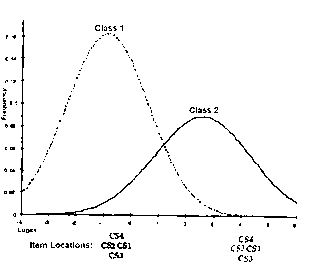
A fundamental concept underlying most Rasch model applications is Thurstone's 1928 precept: "Within the range of objects for which the measure instrument is intended, its function must be independent of the object of measurement." (American J. of Sociology, 33, 529-554)
But what if this isn"t so? What if there are two or more types of person to be measured for which the measuring instrument behaves differently? For instance, a language test administered to native and non-native speakers. If the persons can be separated by type, then an immediate solution is to construct a measuring system for each type. If the persons can"t be separated, then there is a "mixture" situation. One population (or type) of persons is mixed with another.
A particular "mixture" is that addressed by the Saltus (Lat. "leap") model (Wilson, 1989). The persons are at different levels of psychological development - and the leap from one level to the next changes the way in which the measuring instrument operates. We can guess an individual's level, but not with certainty. We assume that we can identify those items which we expect to operate differently for persons at different levels.
In the simplest case, it is hypothesized that, at each level, the persons can be treated as randomly sampled from a normally distributed population, with a specific mean and standard deviation for that level. Also, while in other mixture models, each dichotomous item has a specific difficulty calibration for persons at that level, the Saltus model is simpler and estimates a much smaller number of parameters: the amount (measured in logits) that each set of items "shifts" in difficulty when encountered by persons in each level.
Thus what needs to be estimated are:
(a) The mean and standard deviation of each level's sample.
(b) The proportion of the total sample at each level.
(c) The difficulty calibration of each item at each level.
An estimation approach is to apply the MMLE (marginal maximum likelihood) formulation with an EM (expectation-maximization) algorithm. At each point, some of the parameters are estimated while others are held steady. Generally this process converges to a stable set of estimates.
From the final estimates, the probability that any particular person belongs to any particular level can be computed. These probabilities can be summed, so that, for instance, the proportion of second-grade boys at a particular level can also be estimated. For individual reporting purposes, it is conventional to consider each person to be at the level with the highest probability for that person, although some people may have a profile of probabilities that are fairly equal across levels.
Mark Wilson kindly assisted with this description.
Mislevy, R.J., & Wilson, M. (1996). Marginal maximum likelihood estimation for a psychometric model of discontinuous development. Psychometrika, 61(1), 41-71.
Wilson, M. (1989). Saltus: A psychometric model for discontinuity in cognitive development. Psychological Bulletin, 105, 276-289.
Wilson M. & Draney K. (1997) Partial credit in a developmental context: the case for adopting a mixture model approach. Chap. 18 in M. Wilson, G. Engelhard, Jr., K Draney, Objective Measurement: Theory into Practice, vol. 4. Greenwich CT: Ablex.
A computer program for estimating this model (and a polytomous version) is available from Karen Draney (kdraney at clink.berkeley.edu).

Results of a dichotomous Saltus analysis (Wilson & Draney, 1997)
Items CS1-4 are shown at their difficulty levels for Class 1 (to left) and Class 2 (to right) in the same frame of reference. In this unusual example, the items are more difficult for the higher ability class, because their increased knowledge misleads them into using an incorrect answering strategy.
The Saltus Model, Wilson M. … Rasch Measurement Transactions, 2004, 17:4 p.953
| Forum | Rasch Measurement Forum to discuss any Rasch-related topic |
Go to Top of Page
Go to index of all Rasch Measurement Transactions
AERA members: Join the Rasch Measurement SIG and receive the printed version of RMT
Some back issues of RMT are available as bound volumes
Subscribe to Journal of Applied Measurement
Go to Institute for Objective Measurement Home Page. The Rasch Measurement SIG (AERA) thanks the Institute for Objective Measurement for inviting the publication of Rasch Measurement Transactions on the Institute's website, www.rasch.org.
| Coming Rasch-related Events | |
|---|---|
| May 17 - June 21, 2024, Fri.-Fri. | On-line workshop: Rasch Measurement - Core Topics (E. Smith, Winsteps), www.statistics.com |
| June 12 - 14, 2024, Wed.-Fri. | 1st Scandinavian Applied Measurement Conference, Kristianstad University, Kristianstad, Sweden http://www.hkr.se/samc2024 |
| June 21 - July 19, 2024, Fri.-Fri. | On-line workshop: Rasch Measurement - Further Topics (E. Smith, Winsteps), www.statistics.com |
| Aug. 5 - Aug. 6, 2024, Fri.-Fri. | 2024 Inaugural Conference of the Society for the Study of Measurement (Berkeley, CA), Call for Proposals |
| Aug. 9 - Sept. 6, 2024, Fri.-Fri. | On-line workshop: Many-Facet Rasch Measurement (E. Smith, Facets), www.statistics.com |
| Oct. 4 - Nov. 8, 2024, Fri.-Fri. | On-line workshop: Rasch Measurement - Core Topics (E. Smith, Winsteps), www.statistics.com |
| Jan. 17 - Feb. 21, 2025, Fri.-Fri. | On-line workshop: Rasch Measurement - Core Topics (E. Smith, Winsteps), www.statistics.com |
| May 16 - June 20, 2025, Fri.-Fri. | On-line workshop: Rasch Measurement - Core Topics (E. Smith, Winsteps), www.statistics.com |
| June 20 - July 18, 2025, Fri.-Fri. | On-line workshop: Rasch Measurement - Further Topics (E. Smith, Facets), www.statistics.com |
| Oct. 3 - Nov. 7, 2025, Fri.-Fri. | On-line workshop: Rasch Measurement - Core Topics (E. Smith, Winsteps), www.statistics.com |
The URL of this page is www.rasch.org/rmt/rmt174c.htm
Website: www.rasch.org/rmt/contents.htm